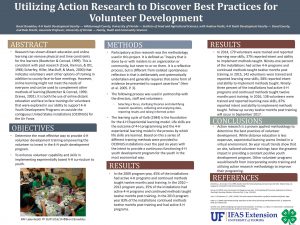Utilizing Action Research to Discover Best Practices for Volunteer Development
Brent Broaddus, South Central 4-H Youth Development Faculty, GCREC- Plant City, FL, with Andrew Toelle, 4-H Youth Development Faculty — Duval County – Jacksonville, FL, and Dale Pracht, Associate Professor, University of Florida — Family, Youth and Community Sciences, Gainesville, FL.
Situation: Research has shown distant education and online learning can remove physical and time constraints for the learners (Boettcher & Conrad, 1999). This is consistent with past research (Cook, Kiernan, & Ott, 1986; Scherfey, Hiller, MacDuff, & Mack, 2000) that indicates volunteers want other options of training in addition to county face-to-face meetings. It is both the use of online distant education and face to face trainings for volunteers that were explored in our ability to support 4-H Youth Development Programs on outside the contiguous United States installations (OCONUS) for the Air Force. Methods: Participatory action research was the methodology used in this project. The following process was used in partnership with the directors, staff and volunteers: Selecting a focus, clarifying theories and identifying research questions, collecting and analyzing data, reporting results and taking informed action. Based on this a series of different training methods were provided over the past eight years with the intent to provide a continuous functioning 4-H youth development program. Results: In 2014, 179 volunteers were trained and reported learning new skills, 37% reported intent and ability to implement methods taught. Ninety-one percent of the installations had active 4-H programs and continued methods taught twelve months post training. In 2015, 142 volunteers were trained and reported learning new skills, 58% reported intent and ability to implement methods taught. Ninety-three percent of the installations had active 4-H programs and continued methods taught twelve months post training. In 2016, 138 volunteers were trained and reported learning new skills, 87% reported intent and ability to implement methods taught. Follow up survey twelve months post training will occur in September 2017. Conclusion: Action research is a proven applied methodology to determine the best practices of volunteer development. While distance education is less expensive, experiential learning seems limited in a virtual environment. Eight-year result trends show that on site, tailored volunteer trainings have the greatest impact in providing a constant positive youth development program. Other volunteer programs would benefit from incorporating onsite training and utilizing action research methodology to improve their programming.
(Click photo to enlarge.)
 0
0

